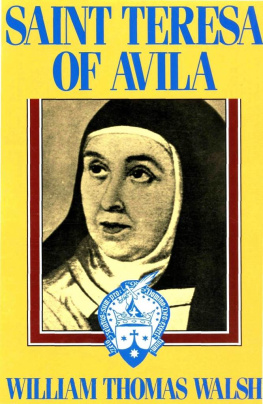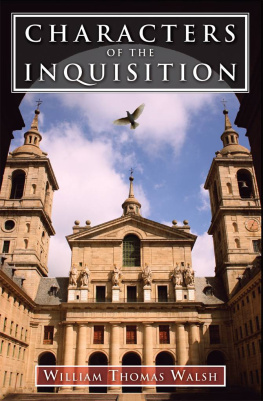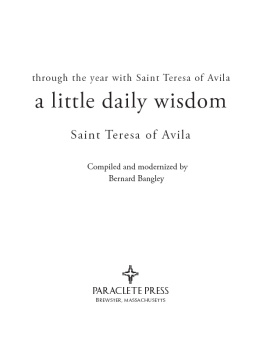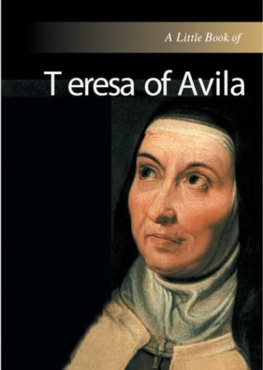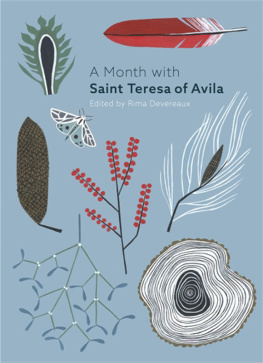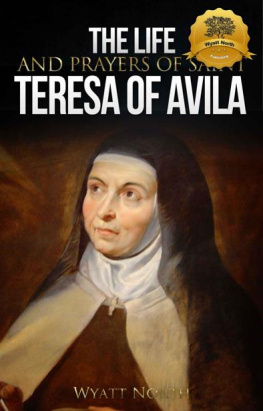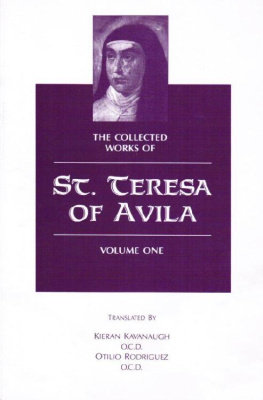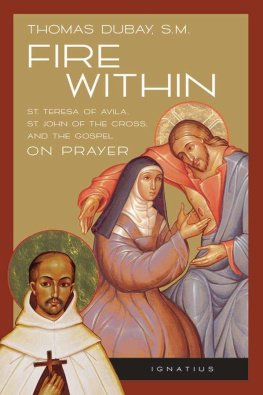William Thomas Walsh - Saint Teresa of Avila
Here you can read online William Thomas Walsh - Saint Teresa of Avila full text of the book (entire story) in english for free. Download pdf and epub, get meaning, cover and reviews about this ebook. year: 2015, publisher: TAN Books, genre: Non-fiction. Description of the work, (preface) as well as reviews are available. Best literature library LitArk.com created for fans of good reading and offers a wide selection of genres:
Romance novel
Science fiction
Adventure
Detective
Science
History
Home and family
Prose
Art
Politics
Computer
Non-fiction
Religion
Business
Children
Humor
Choose a favorite category and find really read worthwhile books. Enjoy immersion in the world of imagination, feel the emotions of the characters or learn something new for yourself, make an fascinating discovery.
- Book:Saint Teresa of Avila
- Author:
- Publisher:TAN Books
- Genre:
- Year:2015
- Rating:4 / 5
- Favourites:Add to favourites
- Your mark:
- 80
- 1
- 2
- 3
- 4
- 5
Saint Teresa of Avila: summary, description and annotation
We offer to read an annotation, description, summary or preface (depends on what the author of the book "Saint Teresa of Avila" wrote himself). If you haven't found the necessary information about the book — write in the comments, we will try to find it.
Saint Teresa of Avila — read online for free the complete book (whole text) full work
Below is the text of the book, divided by pages. System saving the place of the last page read, allows you to conveniently read the book "Saint Teresa of Avila" online for free, without having to search again every time where you left off. Put a bookmark, and you can go to the page where you finished reading at any time.
Font size:
Interval:
Bookmark:
Saint Teresa of vila
A Biography
William Thomas Walsh
Nihil Obstat: H. B. Ries
Censor Librorum
Imprimatur:  Moses E. Kiley
Moses E. Kiley
Archbishop of Milwaukee
January 5, 1943
Copyright 1943 by The Bruce Publishing Company, Milwaukee, Wisconsin. Fifth printing 1944.
The typography of this book is the property of TAN Books and Publishers, Inc. and may not be reproduced, in whole or in part, without written permission from the Publisher.
Library of Congress Catalog Card No.: 87-50928
TAN BOOKS
Charlotte, North Carolina
1987
To
Mother Grace C. Dammann, R.S.C.J., President Manhattanville College of the Sacred Heart New York City, whose friendship has made so much of my work possible

Saint Teresa at the age of sixty-one, from Friar Juan de la Miseria's portrait, for which she sat at Sevilla, in obedience to a superior's command, in 1576.
WORKS BY WILLIAM THOMAS WALSH
The Mirage of the Many (1910)
Isabella of Spain (1930)
Out of the Whirlwind (novel, 1935)
Philip II (1937)
Shekels (blank-verse play, 1937)
Lyric Poems (1939)
Characters of the Inquisition (1940)
"Gold" (short story)
Babies, not Bullets! (booklet, 1940)
Thirty Pieces of Silver (a play in verse)
Saint Teresa of vila (1943)
La actual situatin de Espaa (booklet, 1944)
El caso crucial de Espaa (booklet, 1946)
Our Lady of Ftima (1947)
The Carmelites of Compigne (a play in verse)
Saint Peter, the Apostle (1948)

ACKNOWLEDGMENT
Y EARS ago, when I read an English translation of Saint Teresa's Autobiography , as it is improperly called, I wondered whether a woman in whom the divine and the human so strikingly met could really have been as banal, as priggish, as self-consciously "literary" as she often appeared in those pages. Later, when I was able to read the Spanish text, I discovered that the irritating qualities were not hers, but her devout translator's. What a vital book to be embalmed in so much stuffy rhetoric! I resolved that whenever it was necessary to quote that work, I would make my own translations, and as literally as possible, even at some sacrifice of euphony; not excluding the occasional slips in grammar, faulty reference, careless sentence structure, and vigorous colloquialisms of one who wrote with no eye to bookish effect, but just as she spoke, rapidly, tersely, wittily, now and then quite awkwardly. Only thus could one convey, in another language, the characteristic quality, the timbre and rhythm of writings which, whatever their technical faults or peculiarities, were always honest, gusty, human, interesting, and stimulating, often aglow with the beauty and sublimity of genius directed by sanctity. When I came to her letters and later treatises, there were some good translations at hand, notably the excellent ones by the Benedictines of Stanbrook Abbey, England. But having gone so far with my own, it seemed imperative to continue for the sake of uniformity of style the style being, I hope, Saint Teresa's rather than mine.
The material now available for a new life of this glorious doctor of the science of love is such that the situation seems to call for selection, arrangement, and simplification in a single volume for general use, rather than further research or critical hairsplitting. The chief sources are still the several volumes of letters, treatises, and narratives by Saint Teresa herself, the depositions of witnesses for her beatification and canonization, and the contemporary biographies, of which the most useful is that of Father Ribera, S.J., followed by those of Father Yepes, Father Julian of vila, and Fray Luis de Len in the order named. Any attempt on my part to go much beyond these would be presumptuous in the light of the vast achievement of Father Silverio de Santa Teresa, O.C.D., who has edited and annotated all of her works in masterly and exhaustive fashion, besides publishing, as the crown of a lifetime of study, a biography of her in five huge volumes.
My first acknowledgment, then, must be to Father Silverio for making the results of his labor available to me in fourteen tomes of the Biblioteca Mstica Carmelitana (the B.M.C. to be mentioned so frequently hereafter), which he has sent me from Rome at the request of my good friend Dame Beatrice, O.S.B., of Stanbrook Abbey, one of the greatest living Teresian scholars in her own right, to whom also I am indebted for notes, advice, and many other kindnesses, besides her excellent renderings of the Saint's letters, poems, and other writings, which I have so often had occasion to consult when working on my own translations. For the use of books, theological counsel, and other invaluable assistance I must thank the Reverend Father John J. McSherry of New York City; the Reverend Father Ferdinand Pedrosa, O.P., of Letran College, Manila; the Reverend Father Joseph Husslein, S.J., Ph.D., editor of the Science and Culture Series , who suggested this work to me; the Reverend Father Eugene A. Moriarty of Bridgeport, Connecticut, and the Reverend Father Leo W. Madden, Lieut. Commander, Ch.C., U.S.M.S.
To my colleague, Miss Mercedes de Arango, M.A., for proofreading; to Miss Carmen de Arango, for scholarly help of the most expert kind in preparing some of my preliminary notes; and to other friends, particularly Miss Angela Williams and Miss Lucille Flagg, I am greatly obliged. I have had unfailing encouragement from Mother Grace C. Dammann, R.S.C.J., and Mother Eleanor M. O'Byrne, R.S.C.J., president and dean, respectively, of Manhattanville College of the Sacred Heart, and all my other associates there. And I have no words to express my thanks for the patience, loyalty, and intelligent criticism of my wife, who has typed the entire manuscript more than once.
No bibliography is furnished here because I could not improve upon the easily accessible ones of Father Silverio, both for Saint Teresa and for Saint John of the Cross.
Finally, it must be obvious that no powers of mine could have brought to a conclusion a task for which I am so ill-prepared spiritually. There have been many discouraging moments, even with such treasures of scholarship as the works of Father Silverio, Dame Beatrice, and others beside me; and I know I should never have completed the book, such as it is, without the prayers of far better persons to aid me. I am especially grateful to several women who, like Saint Teresa, have dared to take the words of Christ our Lord literally, and to accept all the consequences of regarding Him not merely as an historical character, but as the One, together with the Father and the Holy Ghost, in Whose presence and by Whose power and consent we live and breathe: to Mother Saint Mary Catherine, C.N.D., of Notre Dame College, Staten Island, who first introduced me to this marvelous Saint in 1929; to Dame Beatrice, O.S.B., of Stanbrook Abbey; to Sister Mary Ignatia, S.M., editor of the Magnificat , Manchester, New Hampshire, and her Teresian household; to Religious of the Sacred Heart at Manhattanville; to the late Sister Mary Boniface Keasey and others of the Missionary Servants of the Blessed Trinity in Alabama; to the late Mother Augustine of the Mother of God, C.D., prioress of the Discalced Carmelites at Santa Clara, California; to the late Sister Mary Gabriel, a Carmelite at Chichester, England (born a Neopolitan princess), who offered Him all the Friday penances of the last year of her life for this my intention; and to my daughter, Sister Mary Concepta, S.M., of the Sacred Heart Convent, Belmont, North Carolina, who has given Him the lovely flower of her youth. If there is any good here besides the human interest of an amazing life story, I have these dear friends to thank.
Next pageFont size:
Interval:
Bookmark:
Similar books «Saint Teresa of Avila»
Look at similar books to Saint Teresa of Avila. We have selected literature similar in name and meaning in the hope of providing readers with more options to find new, interesting, not yet read works.
Discussion, reviews of the book Saint Teresa of Avila and just readers' own opinions. Leave your comments, write what you think about the work, its meaning or the main characters. Specify what exactly you liked and what you didn't like, and why you think so.

